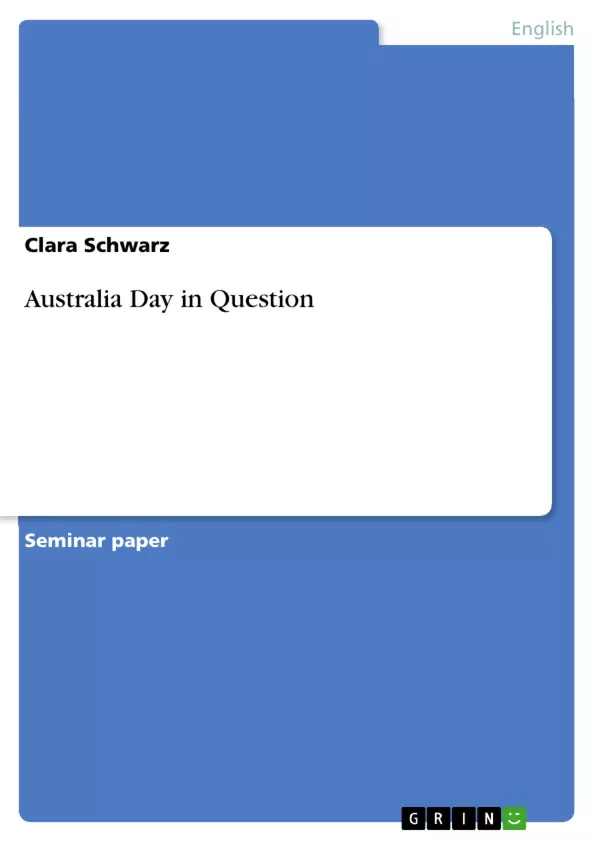Every January the Australian population celebrates its national day – Australia Day - with breathtaking fireworks and sumptuous barbecues. However, this public holiday is accompanied by numerous protests by the indigenous community of Australia. For the majority of Indigenous Australians who have long suffered under colonial domination, Australia Day is not a day of joy, but rather a day of political and cultural struggle.
Since the 19th century the Indigenous Australians – the communities of Aboriginals and Torres Straight Islanders – have fought hard for their equality within the Australian community. However, the process of reconciliation between Indigenous and non-indigenous Australians began only in earnest in the 1960s and the Indigenous are still at a disadvantage compared to their non-indigenous counterparts today.
There is a lively debate about the pros and cons of Australia Day. Some Australians wish to change the date of Australia Day in order to advance the process of reconciliation, while the Australia Day National Committee appeals to all Australians to celebrate Australia Day and reflect on the Australian history.
Inhaltsverzeichnis (Table of Contents)
- INTRODUCTION
- 1. HISTORY OF FOUNDATION DAY
- The Public Holiday Australia Day
- The First Official Celebrations
- The Centenary of Australia Day
- The Federation of Australia
- The Bicentennial of Australia
- 2. AUSTRALIA DAY CELEBRATIONS
Zielsetzung und Themenschwerpunkte (Objectives and Key Themes)
This paper examines the history and significance of Australia Day, focusing on its evolution from a celebration of British colonization to a day of national pride and reflection on Australian history. It also explores the controversy surrounding the date of Australia Day and its impact on Indigenous Australians.
- The history of Australia Day and its origins in British colonization
- The evolution of Australia Day celebrations and its national significance
- The impact of British settlement on Indigenous Australians
- The debate surrounding the date of Australia Day and its implications for reconciliation
- The perspectives and experiences of Indigenous Australians on Australia Day
Zusammenfassung der Kapitel (Chapter Summaries)
INTRODUCTION
The introduction introduces the concept of Australia Day and its significance as a national holiday in Australia. It highlights the controversy surrounding the date of Australia Day and its impact on Indigenous Australians. The author discusses the ongoing struggle for equality by Indigenous Australians and the debate surrounding the date of Australia Day.
1. HISTORY OF FOUNDATION DAY
This chapter explores the historical context of Australia Day, tracing its origins to the arrival of the First Fleet in Sydney Cove in 1788. It delves into the early celebrations of the day, the process of federation in 1901, and the bicentennial celebrations in 1988. The chapter also examines the media reaction to the celebrations and the changing perspectives on the significance of the day.
2. AUSTRALIA DAY CELEBRATIONS
This chapter focuses on the contemporary celebrations of Australia Day, highlighting the various events and activities that take place across the country. It explores the symbolism and significance of these celebrations and the diverse ways in which Australians engage with the national holiday.
Schlüsselwörter (Keywords)
The main keywords and focus topics of the text include Australia Day, Foundation Day, Indigenous Australians, British colonization, reconciliation, national identity, and historical perspectives.
Frequently Asked Questions
What is the significance of Australia Day?
Australia Day is the official national day of Australia, celebrated annually on January 26th to mark the arrival of the First Fleet in 1788.
Why is Australia Day controversial for Indigenous Australians?
For many Aboriginal and Torres Strait Islander people, it represents the beginning of colonization, dispossession, and suffering, often referred to as "Invasion Day."
What is the process of reconciliation?
Reconciliation aims to improve the relationship between Indigenous and non-indigenous Australians through recognition of past wrongs and equal rights.
Is there a movement to change the date of Australia Day?
Yes, there is a lively public debate about moving the holiday to a more inclusive date that all Australians can celebrate without historical pain.
How was the Bicentennial in 1988 celebrated?
The Bicentennial featured massive celebrations of 200 years of European settlement, but also sparked some of the largest Indigenous rights protests in Australian history.
- Citar trabajo
- Clara Schwarz (Autor), 2009, Australia Day in Question, Múnich, GRIN Verlag, https://www.grin.com/document/142611



